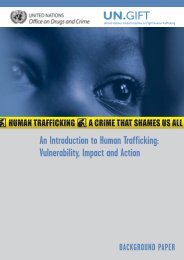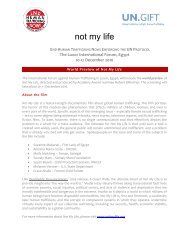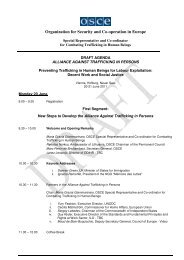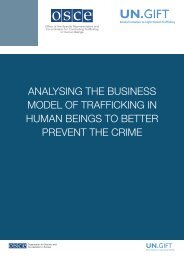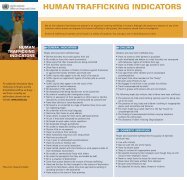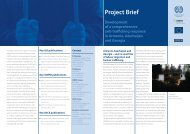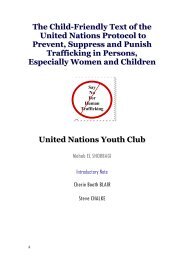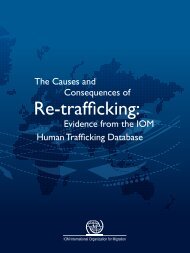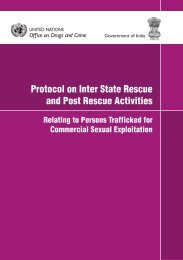India Country Report - United Nations Office on Drugs and Crime
India Country Report - United Nations Office on Drugs and Crime
India Country Report - United Nations Office on Drugs and Crime
Create successful ePaper yourself
Turn your PDF publications into a flip-book with our unique Google optimized e-Paper software.
CHAPTER<br />
5<br />
PUBLIC PRIVATE PARTNERSHIPS:<br />
To Prevent <strong>and</strong> Combat Trafficking of Women <strong>and</strong> Children for Commercial Sexual Exploitati<strong>on</strong><br />
One of the challenges faced in the rehabilitati<strong>on</strong> <strong>and</strong> re-integrati<strong>on</strong><br />
of the victims is that of providing them with sustainable livelihood<br />
opti<strong>on</strong>s. It is often seen that imparting traditi<strong>on</strong>al skills such as<br />
tailoring <strong>and</strong> embroidery, c<strong>and</strong>le making, doll making, block printing etc, do<br />
not always provide them with steady markets or income <strong>and</strong> thus increases<br />
their vulnerability of being re-trafficked. With the spread of globalizati<strong>on</strong><br />
<strong>and</strong> liberalizati<strong>on</strong>, a large number of creative <strong>and</strong> innovative as well as more<br />
lucrative livelihood opti<strong>on</strong>s are emerging which factor in the market dynamics.<br />
In the recent past, there is a growing percepti<strong>on</strong> that public private partnerships<br />
are not just a charitable venture, outside of the company, but <strong>on</strong>e where socially<br />
resp<strong>on</strong>sible processes, whether for developing human capital, especially women<br />
<strong>and</strong> children, or to put in place a gender friendly mechanisms, or to supplement<br />
<strong>and</strong> complement the Government’s efforts to benefit the disadvantaged <strong>and</strong><br />
marginalized are an inherent part of the ethos of the company.<br />
In the recent past, there<br />
is a growing percepti<strong>on</strong><br />
that public private<br />
partnerships are not just<br />
a charitable venture,<br />
outside of the company,<br />
but <strong>on</strong>e where socially<br />
resp<strong>on</strong>sible processes are<br />
an inherent part of the<br />
ethos of the company.<br />
The need for this is all the more relevant today with growing globalizati<strong>on</strong>,<br />
de-regulati<strong>on</strong>, <strong>and</strong> privatizati<strong>on</strong> where development of human capital <strong>and</strong><br />
enhancing income generating activities <strong>and</strong> entrepreneurship am<strong>on</strong>gst the poor<br />
<strong>and</strong> vulnerable are important determinants of sustainable poverty reducti<strong>on</strong>.<br />
Such ec<strong>on</strong>omic empowerment, especially of women, leads to the creati<strong>on</strong> of<br />
wealth for those at the bottom of the ec<strong>on</strong>omic pyramid, <strong>and</strong> also can act as<br />
a powerful deterrent to social evils such as trafficking, violence <strong>and</strong> abuse of<br />
women <strong>and</strong> children.<br />
Thus, an important partner is the corporate sector, which under the broad<br />
spectrum of public private partnerships can play a greater role in preventing <strong>and</strong><br />
combating trafficking by supplementing <strong>and</strong> complementing the Government’s<br />
efforts. The public private partnership would be effective in areas such as<br />
preventi<strong>on</strong> of trafficking, especially in vulnerable areas, by creating awareness<br />
<strong>and</strong> providing skill building <strong>and</strong> livelihood opti<strong>on</strong>s to potential victims <strong>and</strong><br />
rehabilitati<strong>on</strong> to survivors of trafficking.<br />
The Ministry of Women <strong>and</strong> Child Development, as part of the Internati<strong>on</strong>al<br />
Women’s Day Celebrati<strong>on</strong>s, in collaborati<strong>on</strong> with UNODC, organized a workshop<br />
<strong>on</strong> Combating Trafficking <strong>on</strong> 4 th March, 2008. One of the issues that were str<strong>on</strong>gly<br />
advocated at the workshop was that of public private partnerships <strong>and</strong> suggesti<strong>on</strong>s<br />
were made to carry forward the collaborative efforts in a systematic manner.<br />
<str<strong>on</strong>g>India</str<strong>on</strong>g> <str<strong>on</strong>g>Country</str<strong>on</strong>g> <str<strong>on</strong>g>Report</str<strong>on</strong>g><br />
49



